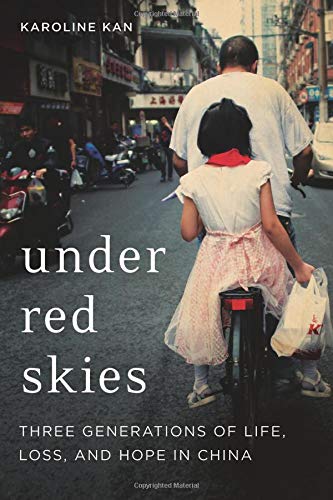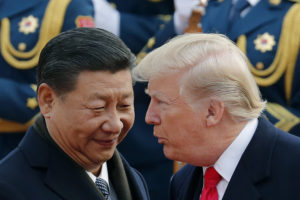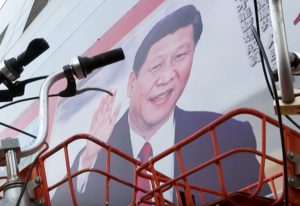Three Generations of Women in China
In the first memoir from a Chinese millennial published in America, Karoline Kan explores yearning for equality and preserving her family's legacy. Beijing. (Mike Behnken / Flickr) (CC BY-ND 2.0)
Beijing. (Mike Behnken / Flickr) (CC BY-ND 2.0)

Purchase in the Truthdig Bazaar
“Under Red Skies: Three Generations of Life, Loss, and Hope in China”
A book by Karoline Kan
Karoline Kan, at only 30 years old, is an eloquent, restrained and gripping writer, a “dancer in chains,” which is how she describes a long-ago teacher who prompted her cautiously to think for herself. In her compelling memoir, “Under Red Skies: Three Generations of Life, Loss, and Hope in China,” Kan tells the story of her family’s tumultuous history and how it has intertwined with China’s turbulent past.
Kan works and lives in Beijing, where she is an editor for China Dialogue. The act of writing a memoir is still an act of subversion in mainland China, where the collectivist spirit reigns, heightened by paranoia and fear. We can hear Kan’s wariness as she assures us how much she loves China and her people, adding, “It is easier to blame China than to understand it; it is easier to judge Chinese people than to get to know them.” But her patriotic fanfare feels forced, and the stories she tells contradict her cheeriness. Her family, a poor one from the rural provinces, is littered with broken people barely able to endure the travesties that have been inflicted upon them.
Kan writes movingly about her troubled relationship with her father, a sad and haunted figure. She describes him as a broken man who rarely spoke at all except when he was intoxicated; then, bitter words flowed from him, unimpeded by his usual timidity. She remembers the last two lines of a poem he once wrote while drunk: “Don’t have the courage to look back twenty years/ In my dreams the scent of books cut me dead.” Kan’s father had been an exceptionally gifted child whose dreams were shattered by the Cultural Revolution. Kan had always been bothered by her father’s disinterest in her school life or her friends, and it is only when she learns about his own tortured history that we see her suppressed anger dissipate into tenderness.
Kan’s mother was a powerhouse of strength and daring. She fought incessantly with her in-laws over matters large and small, and, radically, demanded sovereignty over her own body. When she became pregnant with a second child after already having given birth to a son, she hid the pregnancy so the child would not be aborted by the government authorities. The one-child policy was firmly in place at the time. After a tense nine months, Karoline Kan was born. Her mother’s rebellious act brought considerable consequences. Large fines were levied against her. Bribes had to be paid in order for Karoline to receive the identity card required to get health care, go to school, work and marry. When the government came later on to sterilize her mother, her mother threatened the doctor chosen to perform the surgery until he finally relented and left her alone. When they placed an intrauterine device inside of her mother, she found another physician to remove it. When her relationship with her in-laws became intolerable, Kan’s mother moved her family to her maternal village in Caiyun, and soon afterward when Kan was 7, moved the family to Lutai, a larger village where she and her husband ran an elementary school. Kan’s mother knew that in a bigger village, her children’s chances would be better. She was devoted to their success.
Click here to read long excerpts from “Under Red Skies” at Google Books.
Kan was teased at school and called “Second Child”—a derogatory slur. Like her father, Karoline Kan was excellent in school and focused on college. She had her mother’s ambition and her father’s intellect. When she is given the opportunity to attend university in Beijing, she is disappointed that she has been slotted to study finance, a topic she finds intolerably boring. At that point, Kan already wanted to be a writer, but recognized the difficulty of trying to do so in a country that employs 2 million of its citizens to scan the internet for subversive content. Still, she was not deterred.
Kan was mesmerized by the freedoms Beijing offered her. She got her own apartment and began her first serious relationships with men. But she noticed things in Beijing that disturbed her, particularly how the government discarded those it no longer needed. She found a job writing for a magazine. Her mother and father were horrified by what they saw as her recklessness, her refusal to stay in a field—finance—that would have secured her future.
Kan confesses that she had always been seen by the village neighbors as a strange child, who spent hours listening to the elders talk. She writes, “Some of the stories were mysterious, as though from a book of fairytales. Weasels danced and imitated humans by singing in the village temple. River ghosts enticed villagers to jump to their deaths in a stream. Broom spirits held lanterns to light the way for people walking in the dead of night. The older women used spirits and ghosts to explain things they could not understand.”
Kan struggled to win the trust of her relatives after deciding to write her family memoir. She was afraid of what she would uncover: “My family’s past was like a rusted box locked in a corner, covered with dust. It was so heavy and worn that nobody wanted to touch it. I knew what to expect inside; endless pain. Yet, it was only by opening it that I could understand my family and myself.” Kan treats each of her relative’s stories as separate entities and dismisses the interconnectedness that infuses many Western style memoirs. One senses that this reflects her worldview: Each of us must bear our sorrow privately.
Kan speaks with her uncle, a Red Guard during China’s Cultural Revolution. He still believes that Mao was trying to give power and authority to ordinary people like himself. He defends his actions, which he confesses were often brutal. He tells her about her own great-grandfather who was forced to stand on a stage and renounce his love of Peking Opera and Confucius. Today, her uncle lives on a small pension in the suburbs of Tianjin.
The 1913 Qing Dynasty spared her grandmother’s feet from being bound. Kan learns her grandmother lost two babies, who were known as “little ghosts.” At the time, many believed that babies who died shortly after birth did so as punishment for crimes their parents committed in a past life.
Her maternal grandfather, now 80, tells Kan how he is being harassed by neighbors due to his infatuation with Falun Gong, a meditative practice now banned by the Communist Party. She doesn’t understand why something that has given her aging grandfather solace needs to be taken from him.
Kan remembers the cruelty of her paternal grandmother, who would berate her when her mother was at work teaching. She thinks about a boy who had a crush on her in high school whom she shunned. She remembers the fissures that flowed through her parent’s tense marriage. But she has trouble expressing strong feelings. She is, in so many ways, despite her rebelliousness, a product of the system she has rebelled against.
Kan’s rebellion is tempered by the political and social realities that run throughout China. There are lines she cannot cross. And these lines often change without warning. Her memoir is the first from a Chinese millennial to be published in America. It reveals her to be a bright and observant young woman, happy to be riding the waves of China’s explosive growth, fueled by her mother’s feistiness and her father’s poetic sensibilities, which are now her own.
On visits home to Lutai, she is filled with mixed emotions. We sense her exhilaration at having left, but feel her sadness too. We feel her gratefulness toward her parents, but also her irritation at their stodginess. She is upset by their refusal to accept her decision to become a writer, and her resistance so far to marrying. As she reconnects with old friends and neighbors, “I couldn’t decipher their gestures, facial expressions, and delicate tones. Somewhere along the lines, we had become different. They could tell I was no longer the same. But Beijing also felt strange at times too, not quite ‘home’ either.”
Karoline Kan clearly wants change. She wants equality for women. But she also refuses to denigrate her memories or the suffering endured by her family. She wants to preserve the legacy that served as a springboard for her own liberation from the tyranny and drudgery of life in the rural provinces. All of us look back upon the past with some degree of anger and bewilderment, and, if we are lucky, some tenderness and love. It is this tension that animates Kan’s narrative and allows us to imagine her young life in China—which, despite our nationalistic protests to the contrary, mirrors our own.
Your support is crucial…
With an uncertain future and a new administration casting doubt on press freedoms, the danger is clear: The truth is at risk.
Now is the time to give. Your tax-deductible support allows us to dig deeper, delivering fearless investigative reporting and analysis that exposes what’s really happening — without compromise.
Stand with our courageous journalists. Donate today to protect a free press, uphold democracy and unearth untold stories.






You need to be a supporter to comment.
There are currently no responses to this article.
Be the first to respond.